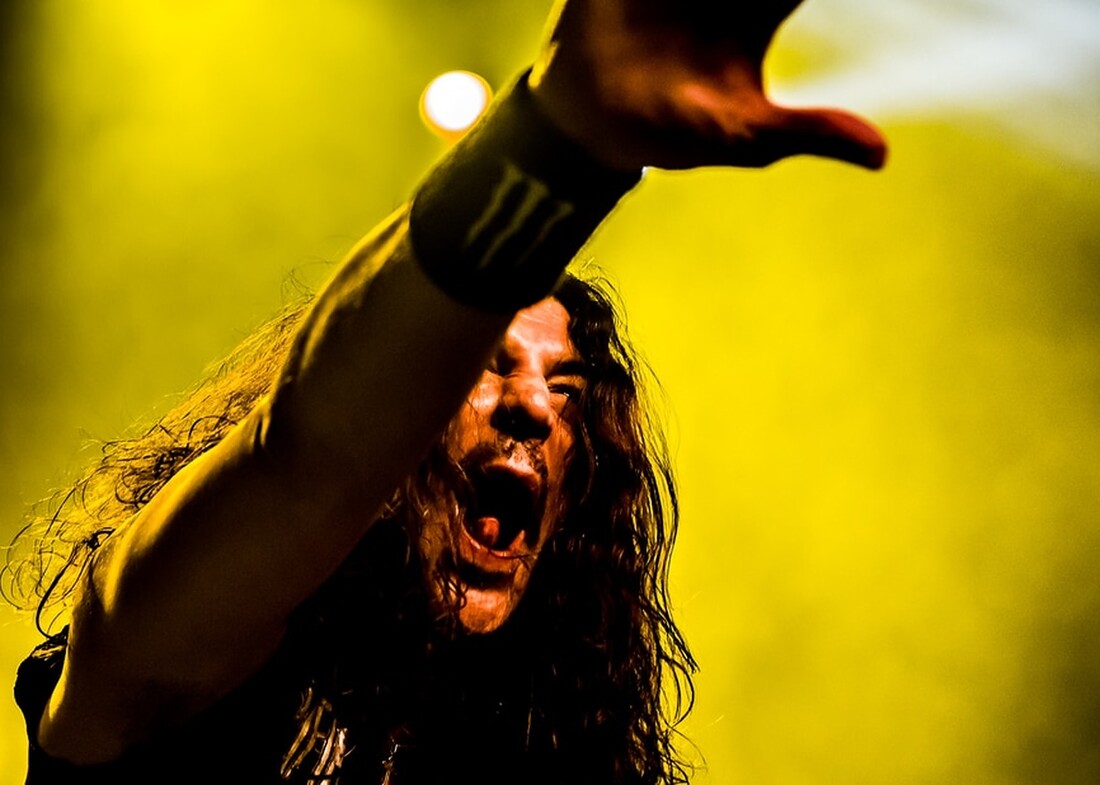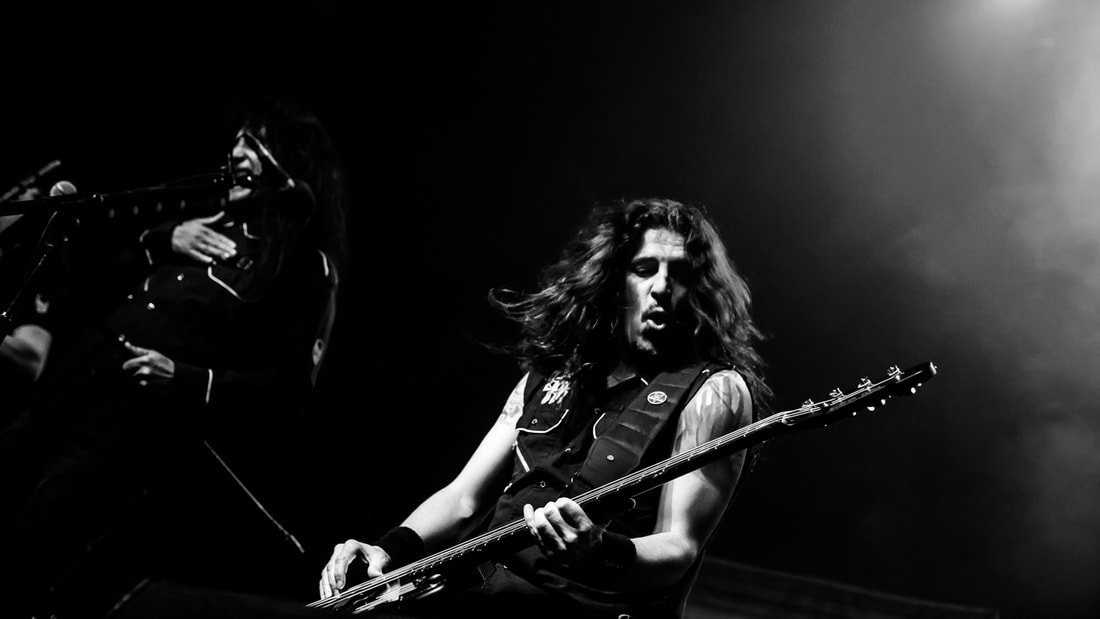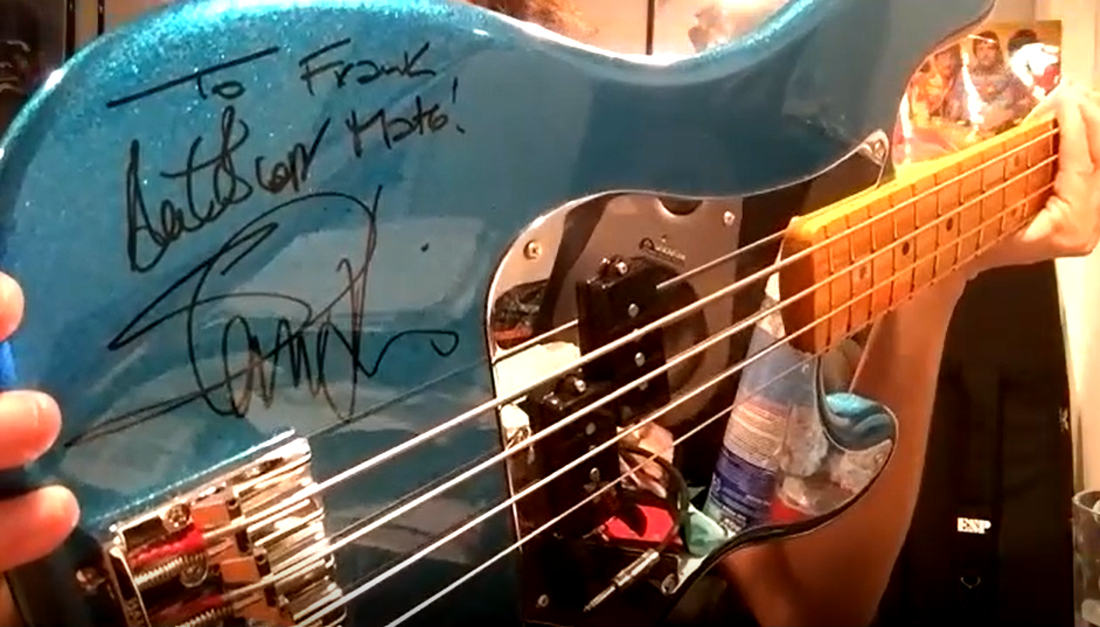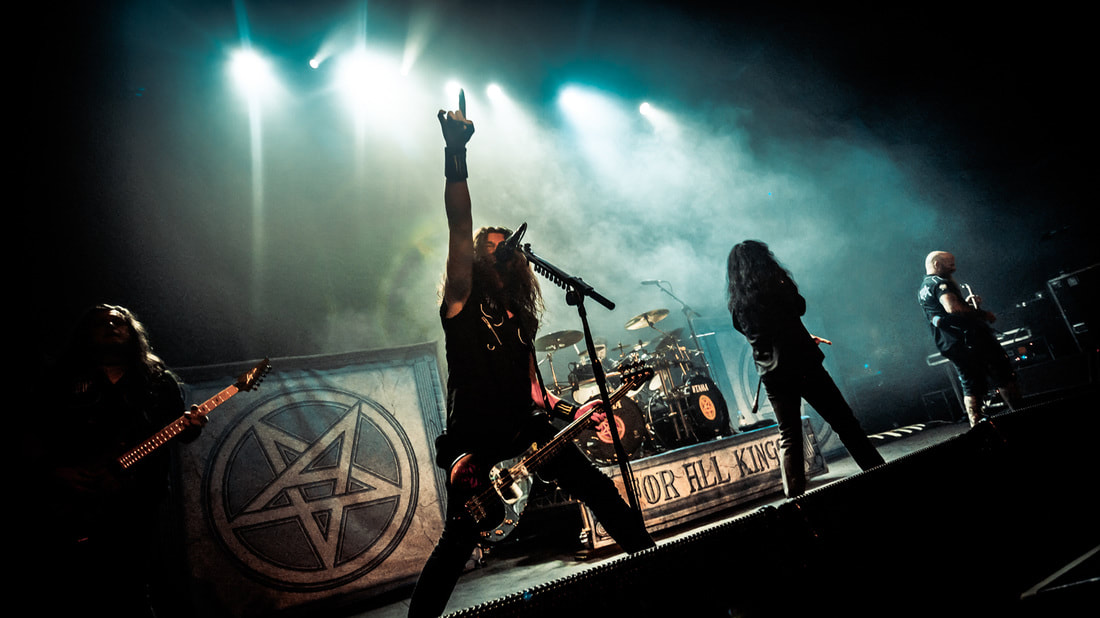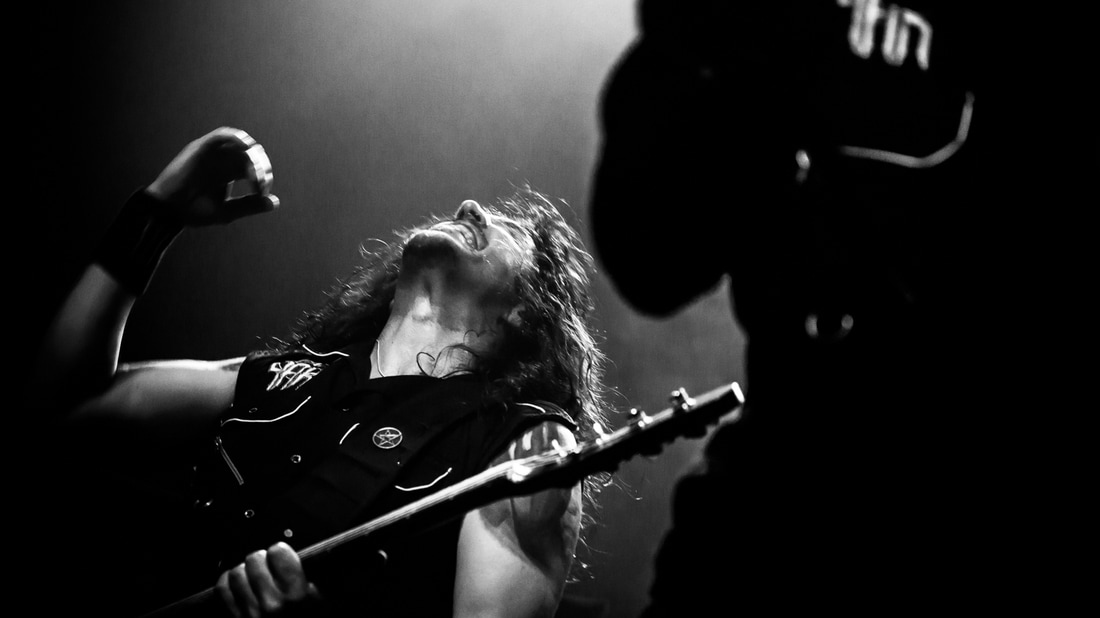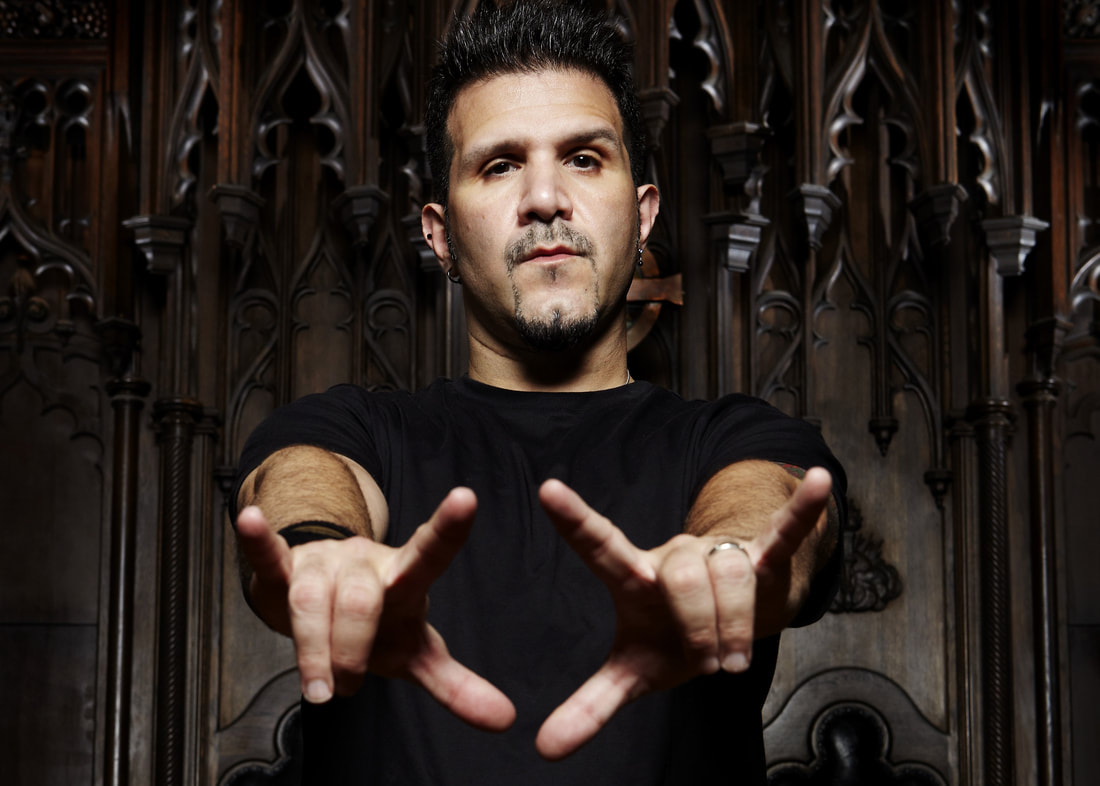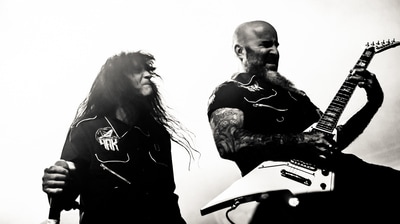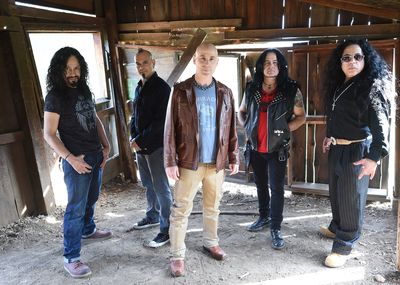|
From a Bronx kid with a rabid fixation on Kiss and Iron Maiden, to sharing stages all over the world with those same heroes, Frank Bello has achieved much during his time holding down Anthrax’s bottom end. With boundless energy and enthusiasm, the bassist’s positive take on life is infectious, but he’s been down some exceptionally dark roads too, as he reveals in his new autobiography ’Fathers, Brothers, and Sons – Surviving Anguish, Abandonment and Anthrax’. “I wanted to bring the reader in”, he says, candidly as we sit down to chat; “it’s very emotional, and it’s all out there”. We joined Frank for an in-depth talk about the book, his four decades in music, and much more besides.
Hi Frank, how are you doing?
I’m well, thank you. I just want people to get back to life, and I’m sure everybody feels the same way. This is a horrible time in our lives, but there’s life out there and it needs to be lived, and music is helping me get through it. But I’m optimistic; optimistic is the key, because what else do you have? I think there’s a better tomorrow. Congratulations on the book. It’s a fantastic read. You know, it’s almost scary because I’ve never done this before. I’ve done this with records, but I’ve never done the book thing. It’s been a year, so to hear people are actually reading the book is almost like; you don’t want to let it go! It’s like; “oh my god, they have my whole life, right now!” I feel almost like it’s a relief, but at the same time I hope people get it, I hope people understand what it’s about. Before we fully get into it, I wanted to talk about the fantastic 40th Anniversary YouTube series Anthrax did on YouTube; how was it looking back? I found watching those videos that I learned a lot, as a fan. We’re in this band, but I’m still a fan of this music, so I never take a different perspective. For me, I wanted to watch it as a fan, and I really enjoyed it because, like the past members who are the part of the Anthrax; it was great seeing them, but then it was just fun to hear the different aspects. Even from current band members; seeing their takes on that time in our life. I kept saying to myself; “wow, he felt like that too?!”, because we never really talked about some of that stuff. It was a great trawl through Anthrax history. Yeah, it was just a cool thing. We utilised this time because. I’m in my basement, dude, and this is where I record, I write, I play, and this is where I’ve taken most of my time off during this pandemic. So, doing this video stuff and doing it all here, I found it a good use of our time. Plus, it re-introduced Anthrax to a lot of people, the history, which I really appreciated. Me too, to be honest, just to realise what we’ve been through in our career for 40 years. When you say; “40 years”, that’s a long time, but it felt like this [snaps fingers]. So to the book, and I have to say, it’s a brutally honest read. You know, this book, it’s really weird to be talking about a book because it’s almost just talking about your life. Here’s what I wanted to do in the beginning with Joel McIver, my co-writer; he’s written a lot of books, and the first thing that we wanted to make clear was, I’d like it to just have a setting; like, you and I are at a bar, we’re having beers, and we’re just telling stories, and for me, I think the book; well, this is it. That’s a very personal approach. This is the story of my life, going back and forth, and I wanted it to feel like that. Most people that have read the book, reviewers, they’re saying; “it feels like I am sitting at a bar with you and you’re telling your life story, and the ups and downs”. There’s two things we have in this book; we have the great rock and roll stories that people are looking for. Scott [Ian]’s written books, and they’re two great books that he’s written, but this is my perspective. They’re not the same stories. Some of them touch on some of those stories, but there’s stories from my point of view. But then there’s the other side that people don’t know. That’s the Frank Bellow story, rather than the Anthrax one? The history of my life. Unfortunately we’ve had some serious things go on in my family, and at the end of the day, what I wanted this book to achieve was to say; “look, I got through this and I brushed myself off and I’m still looking forward and wanting to move on with my life; you can do it too”, and that’s the way I look at it. There’s a lot of people hurting right now, and I think it’s a really good time for a book like this, because it shows you, man, no matter how many times life knocks you down, you’ve got to brush yourself off and see what’s next. You are always so positive, and even with the darker elements in the book which we’ll get too, it always comes across with that up-beat attitude.
Thanks you. You know, for me, there’s this whole thing about growing up. The big story with this book is it’s about abandonment. My dad took off when I was ten years old, from a family of five; that’s the background of the book. My brother Anthony was six months old – he was a baby – so I didn’t understand any of that; going on welfare, losing our house; all that stuff, growing up, and my outlet, my saving grace was music. My heroes that I looked up to as father figures - if you want to call them that - people that I wanted to be like and emulate were bass players; Gene Simmons, Geddy Lee, Geezer Butler, Steve Harris. These people made me want to do this, and that was my tunnel vision kind of vibe; that is something positive that I want to do that I know I can do. That’s a fantastic focus. That was my goal, so whatever I’ve been through; the abandonment, getting my ass kicked every day going to school from these two bullies that you can read about in the book, about how you can come from that. That’s the reason why, after being bullied so much, I had to move in with my grandmother, because it was easier and it was a safer place for me. It was the music house, and the same house where my drummer Charlie Benante grew up in. He’s my uncle, but we grew up as like brothers. He’s two years older than me, and it really worked out because we clicked, musically. Music became my outlet and my goal, and my passion for life. Your devotion, as a fan has led to some amazing stories in the book, including how you used to stalk Kiss! There’s a lot of fun stories about my upbringing. To take you to the place where it was, I grew up in the Bronx in New York. Now, growing up as a diehard Kiss fan you have to understand, I just wanted to meet them because those were the days when you didn’t know what they looked like without make-up. It was very mysterious. So, me and my group of friends – specifically my friend Tom – our goal was to meet these guys and get to know them somehow. We knew they were New Yorkers; they lived in New York, and they lived in Manhattan, and that was twenty-five minutes from us. So basically, they were close by and you figured you had a shot at meeting Kiss? Tom had an ‘in’ with the management. Somehow, he got calls about when these guys were going to have a meeting in Manhattan at the management office. I still remember, it was on 56th Street, Madison Avenue. We went down there - we took the bus, the Manhattan Express - and we cut out of school, and we would sit out and wait from say, 10 o’clock in the morning until whatever time Kiss showed up. We didn’t know what they looked like because their faces were always covered with make-up, so we would just look for these 6ft 1, 6ft 2 guys with suits on, with long hair, walking through the streets, and that’s how we knew it was the guys in Kiss. So that tenacity paid off! Yeah. We got to meet them and eventually, we got to know them. This was a great time in our lives because we got this inside scoop on Kiss, and we would ask them every question in the book; “when’s your new record coming out? What’s the new songs like? When’s the tour?”; we got all the inside info. As diehard Kiss fans, they were our superheroes, and they were very, very cool to us, and it taught me a great lesson in life of how to treat fans. If I ever became successful, I said; “alright, these guys are cool, and they’re talking to us one-on-one” – specifically Gene Simmons, who I’m proud to say wrote the forward to this book, which is an honour for me. Do you hang on to that sort of memorabilia; the signed albums etc? You know what’s funny, I just found this, and this is how much of a fan I am of music, and bass players. Check this out; I just pulled this out. I was just going through my storge. Do you know what this is?! [pulls out Steve Harris replica bass] You know what this is, right?! I want you to see something; that’s what kind of fan I am of the people I grew up with. This is a Steve Harris signature bass, and while I was on tour with him, he was kind enough to sign it for me. I’m proud to say he’s my friend now, so it’s really great. Your love of the music is infectious.
I’m a diehard for music because music has done so much for the outlet of my life. Going back to the book, I don’t think I would have made it without music, I don’t think I would have made life because it was always the outlet for the pain of abandonment. This is after a lot of therapy, just so you know, and this is why I can say this. Growing up without a dad, and poverty; all that stuff, I don’t think I would have been sane enough to finish life, because the pressure was too much. So the outlet of music, it was a great thing in my life. There’s so much to talk about re your own music career with Anthrax, so I wanted to get to ‘State of Euphoria’ [1988], which you admit you feel is unfinished. As honest as I can be with this, you look back with perspective, and you say; “why do I feel like that?” You go through the records and that sticks out for me. I specifically remember we just wanted more time. The songs were okay, but now, if I put an Anthrax song through the mill, we really take it apart; we really listen for a long time [before committing to it]. Those were the days - specifically for ‘State of Euphoria’ - when there just wasn’t the time. We were always on another tour. That record went gold immediately; ‘Among the Living’ [1987] was a high, and so it kept going. There was another tour booked, and time became really precious. All I say with that record is that with songs like ‘Schism’ - just going as a fan - I just wish we had more time to develop that a little bit more. So a little more time, you feel, would have improved things? That’s the time it was so busy. I don’t think it’s a bad record at all. I love a lot of the songs, but there’s a couple of the songs I just wish we had more time to formulate and just really live with. It was a great time in our life, and it’s still a lot of people’s favourite record, but for me, I would have liked to fine-tune it a little bit more, just a couple of songs. It’s not a big deal, but in the history of our band that’s what makes it. How was it for you when Joey Belladonna left the band in 1992? It was tough. Nobody wants to make that move. It was a very tough time in the band. But you know what, at that time, that needed to happen. I see Anthrax as two different bands - as a fan, not only as a band member - we had the Joey era, and then the John Bush era. I just think they’re two different bands that I’m a big fan of. I really love all the songs from each band. With John, you have a different voice; you have more of a raspy voice, and Joey’s got the cleaner. I really enjoy, now I can listen to it, even going back to these videos, seeing John. I love John. This is all a family thing, you know what I mean? Sometimes families separate and come back. With John Bush, that was a good time in our life. We came back with Joey, and this is the Anthrax that we know and love, and I love the John Bush Anthrax, so for me, it’s a win / win. People have their favourites – I get it – but for me, both are my favourites because I think there’s such a great catalogue of music, and I really enjoyed both terms. What are your favourite tracks from the Bush era? There’s songs that just stick out; ‘Room For One More’, ‘Only’. There’s the big ones. There’s just so many! The thing is, I’m proud to say in my band, Anthrax, there’s a plethora of songs that I would love to play! I mean, I still listen to them, because it was a different era in our life, but it was a good time, and I’m glad to have this catalogue. Sometimes it’s nice just to go back and listen; “oh man, I forgot about that song!” I love that, man. It’s a surprise, so there’s so many that I’d like to do. Also, there’s a lot I’d like to do of Belladonna’s time in the band that we can’t get in because, how many songs can you play in a set list!? Think about it, it’s so tough. I want to make everybody happy, and there’s songs they want to hear. I also like to throw curveballs. You did throw a few of those during the livestream show. We brought some songs out that we haven’t done in forever, including ‘Keep it in the Family’. I love that song. There’s such a catalogue of the Belladonna songs, so that’s even hard to do now, just to get everything in that we want to. If you had complete control of the set and could be as selfish as you wanted, what would you choose? Songs like ‘Finale’, from ‘State of Euphoria’. I’d like to throw in ‘Armed and Dangerous’, just to throw a curveball in there. Just stuff like that. ‘Inside Out’; I love that song. It’s just a fun song, it’s heavy as hell, it punches you in the face. There’s so many like that. I can go back and look at these records, and for me, when I think of these songs it brings be back to the studio time and then the writing of it. We’ve had nothing but great times in the history, writing this stuff and recording them. It’s all a different process. You have producers and stuff, you have a vibe in the studio, and you remember all this stuff. In the past we’ve spoken about the song ‘Pieces’, which was written about the passing of your brother Anthony, and that event forms the centrepiece of the book.
Unfortunately, my brother Anthony, who was 23 years old, was murdered in the Bronx, New York, in 1996; March 25th 1996. I remember Joel and I were writing, and the tears were just flowing, uncontrollably, and I couldn’t stop. That whole chapter, I had a box of tissues, and we had to take numerous breaks because of the pain. I was reliving it. I hadn’t talked about it in a long time, and this is after years of therapy, and all this stuff. I wanted to bring the reader in, and if I’m going to do it, I want to do it right; I want to bring them to see the pain that was there and I want to bring them where I was; at the murder scene, and seeing my brother Anthony under the sheet – that’s the first time I’d seen him in a week, I think it was. I hadn’t seen him in a week, and the next time I saw him, I knew it was him because I knew the sneakers he’d just bought. That paints such a horrifying, vivid picture. Even when I say it now, it still screws me up. It’s very emotional, and it’s all out there. I wanted people to feel and to understand where I was. My mom and I were at the murder scene, and I just embraced her and hugged her, and there were no words. There was just a connection of loss. And then the trail after, because they caught the murderer but they got off on a technicality, and we went through the criminal courts. It’s almost like a Scorsese movie; you’ve got the good guys and the bad guys in the court, and there’s all this friction there. You’ll read the book and you’ll understand that there’s a very real thing, and as far as Frank Bello from Anthrax? That didn’t exist because after that for the two weeks right after that – and this is all in the book - I went into a very dark place where I became a hunter. I wasn’t able to talk about this for a long time without therapy, because I didn’t want to admit this. It's by far the darkest chapter in the book. Not that I’m a tough guy at all, but it made me go into a place that I didn’t know existed in me; a very, very dark place where I was shopping for weapons and hunting. I went on a hunt; I started at 10 o’clock every night, and I’d go down to the location and just hunt until I saw what I wanted to see. I was going for revenge. That’s as honest as I can be. My therapist told me that it’s better to speak about this and get it out. It’s cathartic because nothing happened. The good thing is two weeks after that, life opened up a little bit and I started thinking straight again about how, if I did this, my mom was probably going to lose another son; either by another death, or... And I was going to lose my girlfriend at the time who is now my wife, and I just started saying; “my brother would never want that for me”. My brother would slap me and say; “get on with your life”, and that’s what that whole chapter’s about; it’s really ugly, painful to even talk about. And you channelled that grief into ‘Pieces’. For the song that’s a hidden track on ‘Volume 8’ that the guys in Anthrax were kind enough to let me do. It was a very real thing for me; I needed to get it on there for Anthony, for him. It’s me talking to him. It’s saying goodbye to him. The only thing that’s funny about it is how it’s all coming around again with this book, because people are coming to me now and finding that song. Throughout the years so many people have said how much that song has helped them deal with their loss in their life, and I guess it’s cathartic for them. It did good, it did some good for people and it still continues to. It’s touched a lot of people, and I’m grateful for that. Let’s talk about your ‘passionate’ side; there’s a great story in Scott Ian’s book about the events that led to your short departure from Anthrax in 2003, which came about after Charlie said he wanted to move operations to Chicago.
Well first off, let me tell you this; I love Chicago, so it has nothing to do with Chicago. So, moving the rehearsal studio that is literally ten minutes from my house, and easy and comfortable, it was a very easy life. It was very easy to get to, and was accessible, no matter what time of day or night, so for me, it was a big loss to move my stuff and the band’s gear out. So, yeah, Scott’s book, it was Charlie and I going at it, because I didn’t want it. It was very comfortable for me. He was moving to Chicago, and I said; “why?! When it’s easy for me to keep right here?!” Because he had all the drums and all the stuff, it made more sense, after a lot of talking and negotiating, to move it out there. But I miss New York, and I miss the New York vibe that we had here. We wrote a couple of great records here. That was tough. Charlie still has all the stuff in his lockup. We work it out now because it’s a lot easier to travel than it was. Periodically now, what Anthrax does – Charlie, Scott and I – we’ll either go to L.A. to write a record, sometimes we go to New York, and sometimes we go to Chicago, so we split it all up now. What was it like being outside the band and in Helmet for a year? Joel and I wanted to touch on this because it was a really important time in my life. It was a time where it was a better move for both of us – Anthrax; Charlie and Scott, and myself – to separate for a while. I wasn’t leaving, I wasn’t fired or anything like that; we just needed a break. So my good friend Joey Vera [of Armoured Saint] took my spot in Anthrax and replaced me for a while, and it was great. I went to Helmet. My friend Johnny Tempesta who plays with The Cult called me up and he knew I was just chilling for a while, and he goes; “they’re looking for a bass player in Helmet”, and I go; “I don’t know John, I just need to clear my head”, and he goes; “get out here!” So, long story short, I flew out. Page [Hamilton] and Chris [Traynor], the guys in the band are great guys. love them. I had to learn thirty songs for the jam. We all jammed, and it was right off the bat, and the rest is history. We went on tour and had a fucking blast! Just great times, great shows, a lot of ball busting. Good times. And then you were approached about reuniting Anthrax’s classic ‘Among the Living’ line-up. This was about a year and a half after the Helmet touring. I get a call from management; “there’s going to be an Anthrax reunion; do you want to be part of it?”, so we started having the meetings, and I said; “I’m really comfortable here with Helmet and I’m having a good time”, and I wasn’t sure. But after all this, it worked out. It was everybody getting together, it was all for one, and one for all, and it was a great experience. It was just fun to get together with the guys again and just rock it; really just have fun and pull back to the catalogue, giving people what they wanted to see. People hadn’t seen that line-up on stage in over a decade and a half. It was fun seeing people’s expressions to see that band again. There was a new influx of fans also along with our regular crowd, which was great. The fan base has grown consistently with Anthrax, thankfully, to this day. But I find that’s a great time in our career, to come back like that and have this uproar, and people dig into that part of Anthrax. I have to talk to you about Anthrax’s Yankee Stadium show; what was that like. There’s so many great memories of that day. In the Bronx, New York, they made it ‘Anthrax Day’. We got certificates and everything, and it was a wonderful time. It was a big buzz. The record was coming out [‘Worship Music’, 2011], everything was going well and really on the upswing, and then the show. Think about that. I remember being at that show, and I saw this little old lady in a wheelchair coming into the stadium, and that was your grandmother; you talk about her so highly in the book, so what did it mean to have her there? Even hearing that you saw a different aspect that I saw that day; I only saw here after the show. You have to understand, when people read the book, this book is very much dedicated to strong women in my life; specifically my grandmother, who’s Charlie’s mom. We call her Tina babes. She’s the one that said it’s okay to play music. She’s the one that said; “it’s okay – do your thing”, and she was very nurturing, along with my mom and my aunts and the great people in my life. But specifically there, she was sick, and you saw her come in on the wheelchair. She was battling, and it touches me that somebody else saw a different aspect because I try to relive and see every aspect of her life, and you just got a different part of it and you saw her coming in. She was very special, and that was the last show that she was ever at for Anthrax. She’s been to Anthrax shows before, but that was my grandmother’s last show, and we kind of knew it. What a final show for her to see! We were very thankful for that. She got to see her son and her grandson do well, and it was a tribute to her, and say; “thank you - look what you’ve done.” We grew up ten minutes from that Yankee Stadium. As a diehard Yankee fan it was a big deal for me anyway, but to have my grandmother see that, that her boys did okay; it was a big deal for us. With such a long and varied career, can you name your top three Anthrax albums?
It’s a hard question because I’m a musician, I’m a writer, and they’re all your babies, so it’s tough. I have to say the last two records [‘Worship Music’ and ‘For All Kings’, 2016] are definitely right there, ‘Among the Living’, and I would have put a forth in there for ‘Spreading the Disease’ [1985], because that was my first one. It was my first real record, and it was very special to me recording it and going through the whole process. Coming from a kid in the Bronx to a recording studio was very special for me. But I think what Anthrax are doing now, just as writers and knowing what we’re doing, I’m very excited from the last two records of where we are, and who we are. I think our fan base is growing even bigger than ever, and I’m happy to say that. A lot of people have caught onto that, what we’re doing, and it makes me excited about the future. A track like ‘Blood Eagle Wings’ is up there with the best work Anthrax has ever done. It’s an epic song, and there’s so many different parts to that. It’s funny because going back – we just did that on the live stream – there’s just so many different parts and little pieces that we put in that I’m so proud of that really stand out when you do it live. There’s a fantastic bass solo at the start of that one which has an incredible tone to it. Thank you. That’s a tribute to Cliff [Burton], and he showed me how that was done. He had the wah going, and that’s a wah pedal with distortion, and I love that. I learned from him, and he was the master of that stuff, so that’s a complete tribute to Cliff right there. On the other side of that, what are your least favourite Anthrax albums. For me, again, we go back to ‘State of Euphoria’, but again, they’re like your children, and you can’t say you love one or the other. For my favourites as a fan, yeah, ‘State of Euphoria’ is not the top three. ‘Stomp’ I love, but it’s not top three. And ‘Sound of White Noise’, I love, but it’s still not top three. It’s so hard, but I’ll go with that, right now, and ‘Fistful’ too, because I wasn’t on it! Have you any news on the new Anthrax album, and what’s happening with the band going forward? My publicity agent, I get in trouble with her all the time because she doesn’t want me talking about the new Anthrax record, and I get it! I totally understand, because you have to wait. We all have to wait, because it’s a weird time in our life. We’ll be writing. We haven’t stopped working. We’re doing dibs and dabs, but we can’t do a proper tour yet. We’ve put Europe and the U.K. on for next year, and I pray to god that happens. Believe me, everybody wants to play. We can’t wait to get out, but it’s got to be right. I’m one of you, so I want to go to a show and enjoy it and not have to worry about bringing something home to my family. I just want everyone to be healthy and safe. I think we’ll get there. It’s just going to take patience. And for Frank Bello, what’s next? Great question because I’ve been writing here. I’ve written some solo stuff, so people who liked Altitudes and Attitude – the group I did with Dave Ellefson – I kept writing, and it’s more along the lines of that. I just recorded three more songs in the studio, and I’m really happy with them, and I plan to release them sometime with Megaforce. I don’t know, but I’m going to wait for when they say. A lot of people are asking for this stuff and I appreciate it. I’m having fun doing it, aside from the writing with Anthrax. So there’s a bunch of writing going on, and I’m just staying busy and creative. But for now, all your energies are directed towards the book. It comes out October 12th, and is available at rarebirtlit.com. You can go to my website and get it, and it’s on Amazon. Again, I’m very raw with this, so please be patient, and I hope you enjoy the book. Like this interview? Like us on FaceBook and follow us on Twitter for regular updates & more of the same. Frank Bello's 'Fathers, Brothers and Sons - Surviving Anguish, Abandonment and Anthrax’ is released on 12th October 2021 via Rare Bird, Amazon, and elsewhere. |
|
Anthrax.
"I went into a place that I didn’t know existed in me; a very, very dark place". - Frank Bello.
© 2016 - 2024 eonmusic.co.ukContact: [email protected]
|

